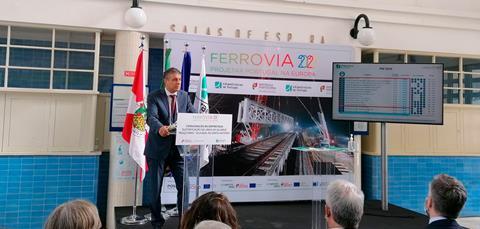
PORTUGAL: Infraestruturas de Portugal has formally launched a €20∙4m electrification scheme covering the 56 km route between Faro and Vila Real de Santo António on the Algarve coast in the south of the country.
Following a series of delays, a contract signing ceremony was held in early November at Vila Real de Santo António station which was attended by Infrastructure Minister Pedro Nuno Santos, IP Chairman Álvaro Araújo and Marcos Rubio Blanco, head of the lead contractor, Sacyr Neopul/Sacyr Somague.
Wiring is due for completion within 23 months, enabling electric trains to run between Faro and Vila Real de Santo António from October 2023.
Other works covered by the project include signalling and telecoms renewals, and station enhancements including the installation of updated passenger information systems.
Electrification will permit a 25 min reduction in journey time between Lagos and Vila Real de Santo Antonio, and enable CP to extend direct inter-city services from Lisboa beyond Faro to Vila Real de Santo António, Tavira and Olhão. There will be important environmental advantages, notably the replacement of the UDD 450 diesel railcars currently used by national operator CP which date from the 1960s.
Procurement of the works has been subject to significant delay, with final contract signature having been planned under the national Ferrovia 2020 programme for mid-2019 and energisation of the route for September 2021.
This had also included the 47 km section between Tunes and Lagos, which is not being wired under the current project. According to IP, this €30m investment is expected to follow in the second quarter of 2022 for completion by 2024.
The Algarve electrification programme overall is being co-funded from EU sources, including Portugal’s allocation under the Recovery & Resilience Plan. With a total estimated cost of €80m, the programme also includes the construction of a traction substation at Olhão and the expansion of another in Tunes.

















